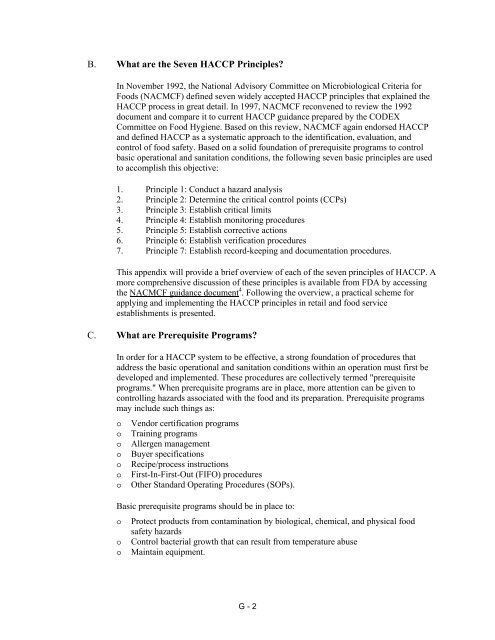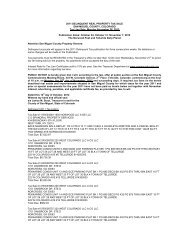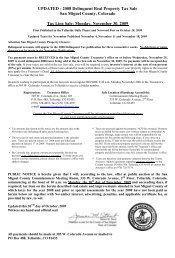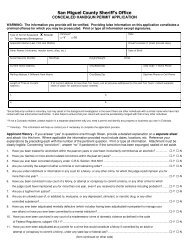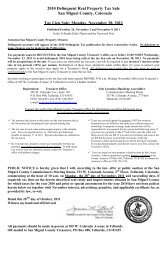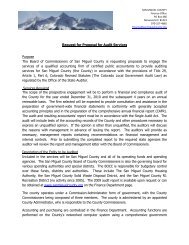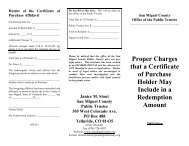colorado retail food establishment rules and ... - Boulder County
colorado retail food establishment rules and ... - Boulder County
colorado retail food establishment rules and ... - Boulder County
Create successful ePaper yourself
Turn your PDF publications into a flip-book with our unique Google optimized e-Paper software.
B. What are the Seven HACCP Principles?<br />
In November 1992, the National Advisory Committee on Microbiological Criteria for<br />
Foods (NACMCF) defined seven widely accepted HACCP principles that explained the<br />
HACCP process in great detail. In 1997, NACMCF reconvened to review the 1992<br />
document <strong>and</strong> compare it to current HACCP guidance prepared by the CODEX<br />
Committee on Food Hygiene. Based on this review, NACMCF again endorsed HACCP<br />
<strong>and</strong> defined HACCP as a systematic approach to the identification, evaluation, <strong>and</strong><br />
control of <strong>food</strong> safety. Based on a solid foundation of prerequisite programs to control<br />
basic operational <strong>and</strong> sanitation conditions, the following seven basic principles are used<br />
to accomplish this objective:<br />
1. Principle 1: Conduct a hazard analysis<br />
2. Principle 2: Determine the critical control points (CCPs)<br />
3. Principle 3: Establish critical limits<br />
4. Principle 4: Establish monitoring procedures<br />
5. Principle 5: Establish corrective actions<br />
6. Principle 6: Establish verification procedures<br />
7. Principle 7: Establish record-keeping <strong>and</strong> documentation procedures.<br />
This appendix will provide a brief overview of each of the seven principles of HACCP. A<br />
more comprehensive discussion of these principles is available from FDA by accessing<br />
the NACMCF guidance document 4 . Following the overview, a practical scheme for<br />
applying <strong>and</strong> implementing the HACCP principles in <strong>retail</strong> <strong>and</strong> <strong>food</strong> service<br />
<strong>establishment</strong>s is presented.<br />
C. What are Prerequisite Programs?<br />
In order for a HACCP system to be effective, a strong foundation of procedures that<br />
address the basic operational <strong>and</strong> sanitation conditions within an operation must first be<br />
developed <strong>and</strong> implemented. These procedures are collectively termed "prerequisite<br />
programs." When prerequisite programs are in place, more attention can be given to<br />
controlling hazards associated with the <strong>food</strong> <strong>and</strong> its preparation. Prerequisite programs<br />
may include such things as:<br />
o<br />
o<br />
o<br />
o<br />
o<br />
o<br />
o<br />
Vendor certification programs<br />
Training programs<br />
Allergen management<br />
Buyer specifications<br />
Recipe/process instructions<br />
First-In-First-Out (FIFO) procedures<br />
Other St<strong>and</strong>ard Operating Procedures (SOPs).<br />
Basic prerequisite programs should be in place to:<br />
o Protect products from contamination by biological, chemical, <strong>and</strong> physical <strong>food</strong><br />
safety hazards<br />
o Control bacterial growth that can result from temperature abuse<br />
o Maintain equipment.<br />
G - 2


